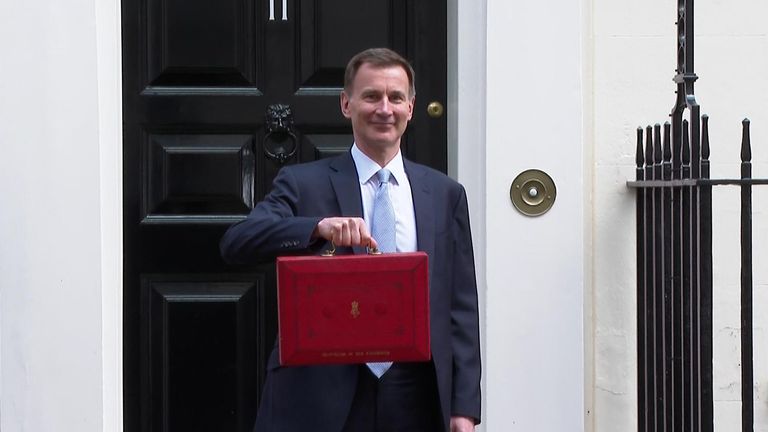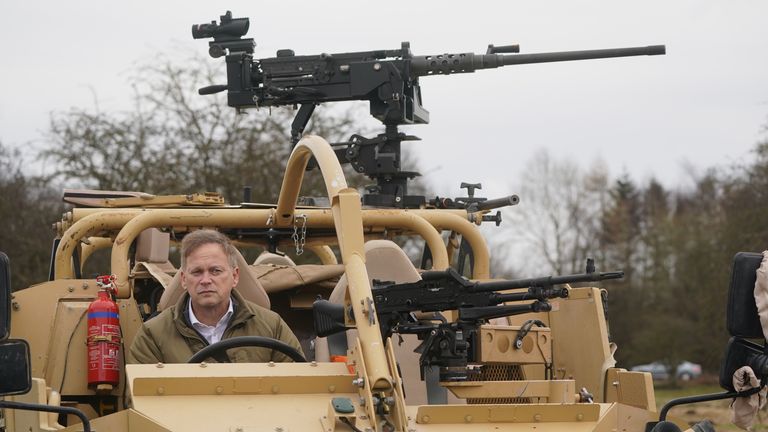Budget’s lack of new defence spending dismays insiders and Tory MPs | UK News
The defence secretary has warned that the UK is in a “pre-war world”, friends and foes are ramping up defence spending, yet the Treasury had nothing new for Britain’s armed forces.
In fact, the level of funding set out in official tables in the spring budget on Wednesday appeared to track a decline of £2.5bn in defence spending in the financial year to March 2025 compared with the previous 12 months – although the Ministry of Defence said this was because the data did not include new money for the military that was pledged last autumn as well as assistance to Ukraine.
Grant Shapps said the overall defence budget was up £1.4bn to £55.6bn.
Still, the absence of any major announcement on defence spending – while not a surprise – was met by dismay among military insiders and even a number of Conservative MPs.
“The defence secretary recently warned that we are moving from a ‘post-war to a pre-war world’ – but nobody seems to have told HM Treasury,” said Mark Francois, a Conservative member of parliament’s defence select committee and former defence minister.
“Does Russia have to get to Warsaw before we start spending what we need on defence?”
Read more:
No pre-election fireworks in Hunt’s safety-first budget
Budget ‘absolutely not’ last throw of the dice before election, says Hunt
Fiscal headroom, inheritance tax thresholds – what key budget terms mean
Malcolm Chalmers, deputy director general of the Royal United Services Institute (RUSI) thinktank, said the lack of additional funding for the armed forces meant the UK appeared out of step with allies and would likely have to cut capabilities.
“One of the striking things in a comparative perspective is that the UK is just about the only major European country which is not increasing its defence budget in real terms, and one of the few European countries which is also not increasing its military assistance to Ukraine much in real terms,” he said in a statement.
This was, he said, in part because the UK had been first in Europe to provide military support to Ukraine and was already meeting a minimum NATO target of spending at least 2% of national income on defence – something that other allies are only starting to achieve.
“But the fact is that now, after the full-scale invasion of Ukraine, many European countries are increasing their defence budgets rapidly, including Germany, the Scandinavian countries, the exposed eastern countries and quite a number of others as well,” Mr Chalmers said.
“And the UK government seems to have decided, given the wider fiscal squeeze and the priority being given to tax cuts, that there will be no more money for defence in this budget.
“Everything else which is not part of the nuclear budget is going to be under severe pressure. The government is going to have to make some unpleasant short-term decisions between different conventional equipment capabilities at a time when the Ukraine war is shining the spotlight on neglected capabilities in which our armed forces clearly need to invest more.”
In January, Mr Shapps used his first big speech as defence secretary to warn the UK was in a “pre-war world” where the foundations of global stability “are being shaken to their core”.
He described this as a “crossroads” where the UK and its allies needed to decide “whether to surrender to a sea of troubles, or do everything we can to deter the danger.”
Mr Shapps said: “I believe that, in reality, it’s no choice at all. To guarantee our freedoms, we must be prepared.”
Less than two months later, Chancellor Jeremy Hunt unveiled his Spring budget.
The only new defence-related pledge was for up to £26m to support a bid by the Office for Veterans’ Affairs to host the Invictus Games in Birmingham in 2027.
China ramping up defence spending
By contrast, China – which has also just fleshed out its spending priorities – is increasing its defence budget by more than 7% to more than £180bn.
The full UK budget statement did include a reminder of a commitment made last autumn to spend an extra £11bn over the next five years on defence.
But most of that money will be channelled into the UK’s nuclear deterrent, with only some going into a much-needed replenishment of ammunition stockpiles.
Daily defence costs down
Confusingly, a breakdown by department of government spending put the Ministry of Defence’s day-to-day running and other resource-related costs at £32.8bn in the year to March 2025, down from £35bn this financial year.
Capital expenditure was also forecast to slide to £18.9bn from £19.2bn over the same period.
The Ministry of Defence said these numbers excluded £2.5bn in new assistance to Ukraine as well as funding announced in the Autumn Statement and “accountancy adjustments”.
It was not immediately clear why this data from last year had not been reflected in the budget tables. It was also not clear why funding for Ukraine was being included as part of the UK defence budget.


